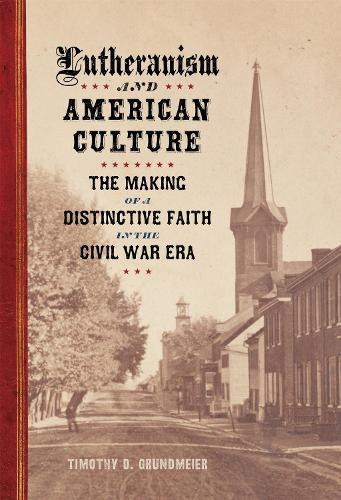Overview
Timothy D. Grundmeier's Lutheranism and American Culture examines the transformation of the nation's third-largest Protestant denomination over the course of the nineteenth century. In the antebellum era, leading voices within the church believed that the best way to become American was by modifying certain historic doctrines deemed too Catholic and cooperating with Anglo-evangelicals in revivalism and social reform. However, by the mid-1870s, most Lutherans had rejected this view. Though they remained proudly American, most embraced a religious identity characterized by a commitment to their church's confessions, isolation from other Christians, and a conservative outlook on political and social issues. Grundmeier shows that this transformation did not happen in a vacuum. Throughout the Civil War and early years of Reconstruction, disputes over slavery and politics led to quarrels about theology and church affairs. During the war and immediately after, the Lutheran church in the United States experienced two major schisms, both driven by clashing views on the national conflict. In the postbellum years, Lutherans adopted increasingly conservative positions in theology and politics, mainly in reaction to the perceived ""radicalism"" of the era. By the final decades of the nineteenth century, Lutherans had established a rigorously conservative and definitively American form of the faith, distinct from their coreligionists in Europe and other Protestants in the United States. Although Grundmeier focuses on a single religious tradition, his study has implications for several areas of Civil War scholarship. First, it demonstrates how the Lutheran experience diverged from that of other Protestant groups, thereby expanding our understanding of how American Christians responded to the era's crises, including slavery, sectionalism, and national identity. In addition, his work reinforces and extends many of the findings in other historical fields: the political culture of the Mid-Atlantic and Midwest, the views of German and Scandinavian immigrants, and the various forms of conservatism among white northerners. Grundmeier's most significant contribution, however, is examining a previously unexplored subject. In the vast corpus of works on the Civil War era and American religious history, scholars have almost entirely overlooked the views and experiences of Lutherans. Lutheranism and American Culture seeks to remedy that neglect and serve as the starting point for understanding the formative decades of this distinctive faith.
Full Product Details
Author: Timothy D. Grundmeier ,
T. Michael Parrish
Publisher: Louisiana State University Press
Imprint: Louisiana State University Press
Dimensions:
Width: 15.20cm
, Height: 2.20cm
, Length: 22.90cm
ISBN: 9780807185209
ISBN 10: 0807185205
Pages: 314
Publication Date: 06 January 2026
Audience:
College/higher education
,
Postgraduate, Research & Scholarly
Format: Hardback
Publisher's Status: Forthcoming
Availability: Not yet available

This item is yet to be released. You can pre-order this item and we will dispatch it to you upon its release.
Reviews
""The book's triumph lies in explaining how the Civil War accelerated a general Lutheran shift toward dogmatic confessionalism, strict church-state separation, and social conservatism—but alongside an ardent embrace of American exceptionalism. All, whether Lutherans or not, who have long desired a thorough account of Lutheran history carefully situated in American history will greatly value this landmark volume."" - Mark A. Noll, author of America's Book: The Rise and Decline of a Bible Civilization, 1794–1911 ""With an expansive knowledge of the terrain and careful attention to unexpected deviations, Grundmeier adeptly charts the denomination's theological and organizational history. The result serves not only as a valuable reference work but also as an important interpretive contribution."" - Alison Clark Efford, author of German Immigrants, Race, and Citizenship in the Civil War Era ""Lutheranism and American Culture fills a significant gap in nineteenth-century American religious history. Deeply researched, richly detailed, and forcefully argued, Grundmeier's work explores the complex interactions between a confessional church in the Civil War era and the broader American culture, including the dilemmas posed by denominational separatism and political conservatism."" - George C. Rable, author of God's Almost Chosen Peoples: A Religious History of the American Civil War ""As an immigrant group moving into nineteenth-century America, the Lutherans were somewhat religiously and culturally different. Timothy Grundmeier's careful history of this dynamic is a fine addition to the history of Lutherans in America, and one that adds depth and complexity to the larger religious history of the United States."" - Mark Granquist, author of Lutherans in America: A New History
Author Information
Timothy D. Grundmeier is professor of history at Martin Luther College, New Ulm, Minnesota.



